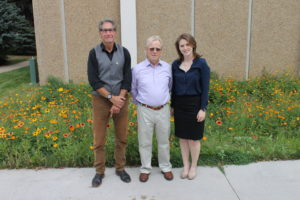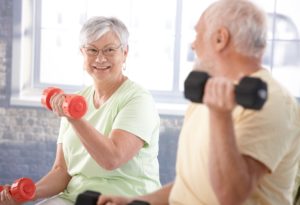Professor Manfred Diehl in CSU’s department of Human Development and Family Studies is challenging negative views on aging and physical exercise in order to promote healthy aging. He is teaming up with colleagues in the department of Health and Exercise Science: HES department head Barry Braun and Adult Fitness Program Director Kimberly Burke. They will work alongside Diehl to approach this complex issue from various perspectives.
Their study is made possible by a $29,946 grant from the Interdisciplinary Pilot Grant Program through CSU’s Prevention Research Center.
“It is exciting to see how this interdisciplinary team of leading researchers at CSU will integrate their respective expertise to test the effects of an intervention that bridges psychological motivation with physical activity,” said Prevention Research Center Director Doug Coatsworth.

The objective
The team’s goal is to shift negative views on aging, such as “aging is all downhill,” to more positive beliefs that increase adults’ physical activity. There are plenty of reasons why many people don’t stick to a workout routine, such as not seeing results as quickly as they’d like, therefore deciding that exercise isn’t working for them. Everyday life can also interfere, especially if a person has a full-time job and children, thus derailing an exercise routine. People often don’t know how to begin exercising again and become sedentary.
“We are offering a new start. It’s never too late to begin exercising,” said Diehl. “Even at age 70, one can benefit from being physically active on a regular basis.”
“It’s a great opportunity to employ team science around an issue with clear, real-world relevance,” said Braun. “This partnership is a prime example of utilizing an interdisciplinary approach to address complex questions in human health and aging.”
The study addresses three key components to encourage healthy exercise habits: improving negative views on aging, improving a sense of mastery and developing goal-planning behaviors.
Psychological barriers
Negative views of one’s own aging, and aging in general, represent psychological barriers that prevent people from taking positive actions that could promote successful aging. Many people believe they cannot influence how they grow older. Showing them that each and every person has opportunities to influence their own aging may heighten their sense of self-efficacy. This may motivate them to strive for behavior change, such as becoming more physically active.
Healthy exercise habits can be picked up at any time or at any age. People may find it very rewarding to see their physical condition built up when practicing a certain routine over a longer period of time. At times, they just need a jump start to motivate them.
 The multidisciplinary team offers an educational program along with a four-week adult fitness program to give people the spark they need for establishing a lasting exercise routine.
The multidisciplinary team offers an educational program along with a four-week adult fitness program to give people the spark they need for establishing a lasting exercise routine.
“If we can provide that jump start,” said Diehl, “then maybe we will have a long-term effect with our program in combination with the educational program.”
‘Multifaceted approach’
Burke and the Adult Fitness Program in HES will work closely with Diehl to ensure the research is tackled from varying perspectives.
“The collaboration utilizes interdisciplinary facets of research as well as a multifaceted approach to learning about the complexities of human aging,” said Burke.
Often people set goals but do not execute the necessary actions toward achievement. By working with participants on developing better goal-planning strategies and behaviors, the team hopes to eliminate related feelings of failure and frustration. They hope this will encourage future goal-setting behaviors and will lead to overall greater success in achieving goals.
“Physical activity is the most promising, non-pharmacological, non-invasive and cost-effective method of health promotion,” said Diehl. “This physical activity translates to promoting healthier aging, which is the overarching goal of the study.”
The long-term goal for the research is to create an evidence-based program that could be delivered in community settings, such as hospitals and senior centers.
Adults age 50 and older who are interested in taking part in this research study can learn about the next dates that the program will be offered by sending an e-mail to adaptresearch@colostate.edu or by calling 970-491-5001.
The departments of Human Development and Family Studies and Health and Exercise Science are part of the College of Health and Human Sciences.